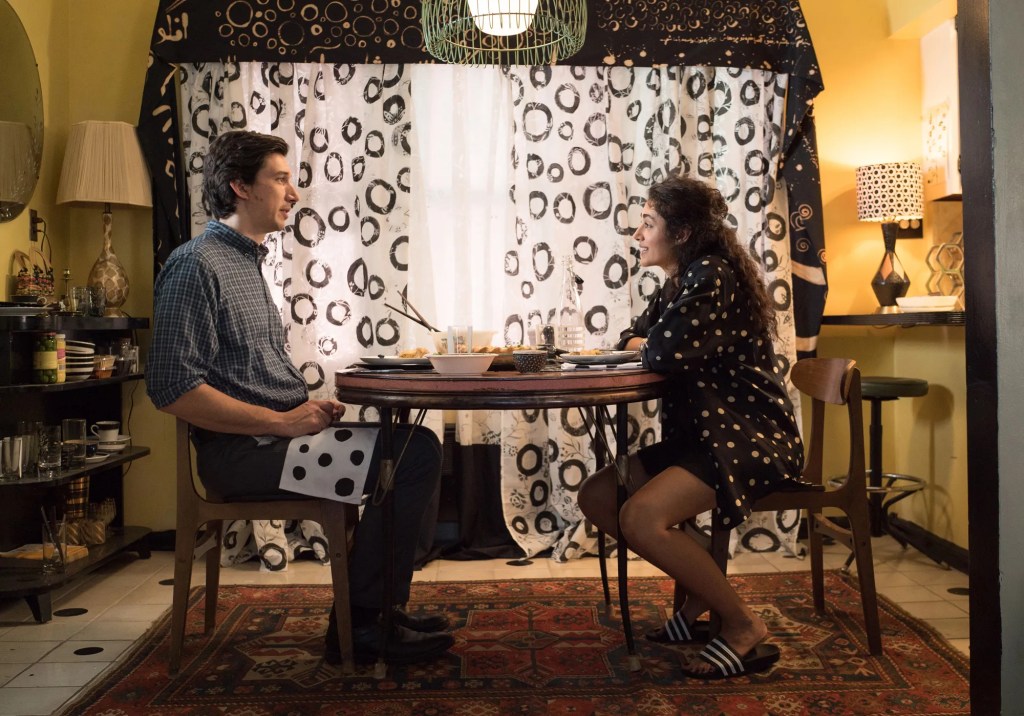Martin Scorsese once said that Adam Driver is “one of the best, if not the best, actors of his generation,” and well, he is not wrong. Over the course of his career, he has worked with a diverse catalog of talent including Noah Baumbach, Jim Jarmusch, Leos Carax, Spike Lee, Ridley Scott, and now, more recently, Francis Ford Coppola with Megalopolis, releasing in theatres this weekend. If anything, Driver has one of the most impressive resumes of working actors.
This begs the question as to why these filmmakers time and time again trust him to compellingly embody their visions. The question begins to answer itself by diving into his filmography, focusing specifically on the range of characters he has brought to life.
Below are five films that showcase some of the best Driver has to offer on the big screen.
Paterson (2016)

What if we celebrated the act of existing? That is exactly the question Jim Jarmusch asks in Paterson where we spend a week with a man sharing the same name as the town he lives in (Paterson, New Jersey that is) who is capturing the beauty of the surrounding world through his pen and paper.
Paterson’s (Driver) subdued nature and embracing of mundanity arguably speaks volumes, offering the audience a chance to sit and reflect upon their own fast-paced lives. The minimal dialogue mixed with the prosaic internal narration demonstrates the pure artistry it takes to deliver a performance so profound with so little, making this, in my opinion, his best performance to date.
What If (2013)

A somewhat surprising pick is Michael Dowse’s What If. It follows Wallace’s (Daniel Radcliffe) struggle for love while those around him, including his passionate roommate Allan (Driver), seem to slip into it with ease – radiating the familiar tones best enjoyed from a 90-minute rom-com.
There is a trend in Driver’s roles where he isn’t necessarily the leading man but will captivate viewers in a way that their attention is solely on him – Allan is no different. While this may, technically, not be the most incredible performance we’ve seen from him, he has arguably one of the most hilarious line deliveries I have heard (you’ll know which one)! That alone is enough to cement this as a performance that proves he can truly inject himself into any character.
Annette (2021)

The divisive Léos Carax film Annette follows the story of stand-up comedian Henry McHenry (Driver) and singer Ann Desfranoux (Marion Cotillard) getting swept up in a romance that subsequently leads to the birth of their gifted daughter Annette (Hebe Griffiths and Devyn McDowell). Her extraordinary talent fragments their relationship, being divided by compassion and greed.
In many ways, the character of Henry plays to Driver‘s greatest strengths as an actor. His background lies in stage productions, having been both on and off Broadway. By allowing the audience to see Henry do his standup routines in an auditorium, he can reinforce the stage presence he is well versed in delivering. Annette is a musical at its foremost so it is a nice touch that we get studio-length songs performed by Driver himself (which we had only seen parts of previously in Marriage Story (2019) and Inside Llewyn Davis (2013)).
Frances Ha (2012)

Whenever Frances Ha is mentioned, the subsequent words that follow are painfully relatable. Noah Baumbach and Greta Gerwig deliver a raw and often overlooked perspective of a coming-of-age film seen through the eyes of the struggling artist Frances Halladay (Gerwig), who sees her life turn to disarray when a lifelong friendship unravels at the seam.
Lev (Driver) is by no means the main character, however, his presence steals every scene he is in. His character is the epitome of the stereotypical charming, rich douche who is with a new woman every night, which perfectly challenges Frances’ awkward persona. To top it all off, the fedora (reminiscent of the hat his character wears in While We’re Young (2014)) rounds this character off as one who has a lot of growing up to do, matching the central theme of the film.
White Noise (2022)

Baumach‘s adaptation of White Noise, the book by Don Delillo, explores an over-exaggerated state of existentialism and societal conformity in the eyes of who we believe to be a typical suburban family in the 80s when a toxic airborne event permeates their town. The stark contrast between the absurdity of the disaster that strikes and the normality of the family that we follow translates into dark comedy which this film thrives off of.
Driver‘s characterization of the father figure, Jack Gladney, perfectly balances the essence of an endearing family man who is rooted in skepticism and dread. This alongside powerful monologues hyperbolising the importance of death in intimate relationships shows how Driver can tackle these themes nonchalantly.
List Courtesy of Nandita Joshi
Feature Image Credit to Amazon Studios

Recent Comments